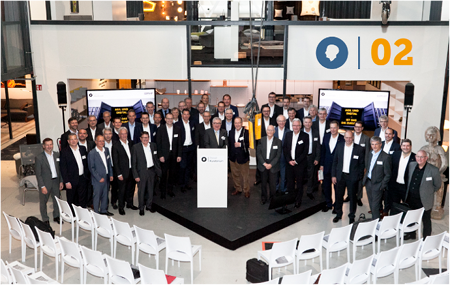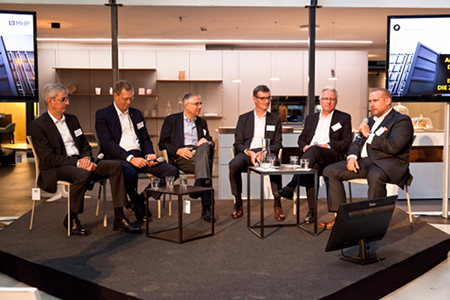CTO autumn forum at MHP and Porsche: Digitization and agile development, WILO reports on new IP management
At the invitation of the new advisory board of the Diesel Board of Trustees, Dr. Markus Kirchler, partner and member of the MHP board of directors, a Porsche subsidiary for IT, strategy and management consulting, the CTO autumn forum 2017 took place in the Porsche Museum in Stuttgart. Thomas Böck, CLAAS, Member of the Group Management, Managing Director Technology & Systems, Oliver Jung, Schaeffler, Board Member for Production, Logistics and Purchasing, Thomas Ricker, Krones, Member of the Board of Management, Dr. Walter Stadlbauer, Schüco International, CTO / COO, Dr. Thomas Steffen, Rittal, Managing Director Research & Development and Wolfgang Zahn, Andreas Stihl, Member of the Management Board.
 In addition, further members of the Board of Trustees were appointed: Dr. Stefan Breit, Miele & Cie, Managing Director, Dr. Markus Klausner, Viessmann Heating Systems, CTO, Dr. Uwe Lauber, MAN Diesel & Turbo, CEO, Hans-Joachim Molka, Roemheld, Managing Director, Dr. Stefan Nöken, Hilti member of the group management and Frank Schnatz, Hansgrohe, member of the executive board. The advisory board was expanded to include Mr. Urban August, Siemens Industry Software CEO Germany, Dietmar Bichler, Bertrandt, Chairman of the Management Board and Andre Kiehne, Member of the Board, Microsoft. The technical and scientific advisory board also receives personal support from Ulrich Dietz, Vice President, Bitkom – Federal Association for Information Technology, Telecommunications and New Media eV, Prof. Dieter Kempf, President of the BDI – Federal Association of German Industry, Andrej Kupetz, General Manager of the German Design Council, Dr. Klaus Mittelbach, Chairman of the Management Board, ZVEI – Central Association of the Electrical and Electronics Industry, and Hartmut Rauen, Deputy General Manager, VDMA – Association of German Mechanical and Plant Engineering.
In addition, further members of the Board of Trustees were appointed: Dr. Stefan Breit, Miele & Cie, Managing Director, Dr. Markus Klausner, Viessmann Heating Systems, CTO, Dr. Uwe Lauber, MAN Diesel & Turbo, CEO, Hans-Joachim Molka, Roemheld, Managing Director, Dr. Stefan Nöken, Hilti member of the group management and Frank Schnatz, Hansgrohe, member of the executive board. The advisory board was expanded to include Mr. Urban August, Siemens Industry Software CEO Germany, Dietmar Bichler, Bertrandt, Chairman of the Management Board and Andre Kiehne, Member of the Board, Microsoft. The technical and scientific advisory board also receives personal support from Ulrich Dietz, Vice President, Bitkom – Federal Association for Information Technology, Telecommunications and New Media eV, Prof. Dieter Kempf, President of the BDI – Federal Association of German Industry, Andrej Kupetz, General Manager of the German Design Council, Dr. Klaus Mittelbach, Chairman of the Management Board, ZVEI – Central Association of the Electrical and Electronics Industry, and Hartmut Rauen, Deputy General Manager, VDMA – Association of German Mechanical and Plant Engineering.

Heinz Dürr, former CEO of AEG and first President of the Deutsche Bundesbahn reported in his keynote speech on the subject of “Everything digital, where is the physical”, on the interaction of digitalization with the real conditions and physical needs of people. Dr. Markus Beukenberg, Chief Technology & Strategy Advisor, WILO SE, presented in his lecture on “Influence of modular product structures and digitization on the innovation process and IP” with great openness the enormous challenge of moving from a product-oriented development and IP process to a module and Platform strategy to come. The discussion that followed was just as enthusiastically received by the CTO group.

The panel discussion with Hans-Jürgen Duensing, member of the Executive Board of Continental AG, Dr. Markus Flik, Chairman of the Management Board, Chiron Werke, Oliver Jung, Executive Board Member for Production, Logistics and Purchasing, Schäffler, Dr. Heinz Kaiser, member of the board, Schott and Wolfgang Zahn, member of the board Andreas Stihl was moderated by Dr. Markus Junginger, partner at MHP. The group faced the question of the digital normality already achieved and was characterized by a high level of dynamism and an open discussion culture.
Prof. Dr. Alexander Wurzer reported on the results of the discussions in the Industry Council Competition of the Diesel Board of Trustees on the subject of “IP as a competitive instrument in Industry 4.0”. The starting point of the CTO talks on digital transformation is defined in business terms. Digitization is not an end in itself – corresponding developments must be profitable for the company. The production of software and apps is now comparatively inexpensive, which is also known to the customers of the technology companies. This means that customers are not willing to pay for standard applications – nevertheless, these must be offered in order to be able to survive against the competition (so-called hygiene factors).
 In order to be able to sell digital added value profitably, the development of new business models with software-based premium services is necessary. One of the most difficult things for established companies in digitization is to reinterpret themselves and develop into a digital company. The more established a company is, the more difficult it is for this company to change its business model logic, since such changes often meet with limited customer acceptance. This makes it all the more important to place property rights at an early stage in order to keep one’s own business model options open and, in particular, to prohibit newcomers from realizing them.
In order to be able to sell digital added value profitably, the development of new business models with software-based premium services is necessary. One of the most difficult things for established companies in digitization is to reinterpret themselves and develop into a digital company. The more established a company is, the more difficult it is for this company to change its business model logic, since such changes often meet with limited customer acceptance. This makes it all the more important to place property rights at an early stage in order to keep one’s own business model options open and, in particular, to prohibit newcomers from realizing them.
In the digital age, it no longer makes sense to build up all the skills needed to manufacture product components internally. Therefore, the vertical range of manufacture is systematically decreasing. In particular, initially insufficient digitization skills are compensated for by the external purchase of programming. In such external developments, however, it is imperative that the company’s own “company DNA” be recognizable in order to transfer known strengths to digital components, to make competitive differentiation visible and to maximize recognition. With increasing opportunities to build up your own skills, software development can be carried out in-house to prevent external programmers from selling the know-how to competitors.
 Digital business models are increasingly gaining in economic relevance for companies, but implementation is proving to be a challenge. There are a variety of ways to collect data and make it usable. However, in many places there are still no concepts for generating added value for customers from this data and developing business models based on this. So the following basic question of digitization arises: How can the largest possible share of the sales generated in the value chain be directed to one’s own company? The aim is thus to create an eco-system by bringing about other stages in the value chain. For example, with efficiency effects in the value chain through superior information processing.
Digital business models are increasingly gaining in economic relevance for companies, but implementation is proving to be a challenge. There are a variety of ways to collect data and make it usable. However, in many places there are still no concepts for generating added value for customers from this data and developing business models based on this. So the following basic question of digitization arises: How can the largest possible share of the sales generated in the value chain be directed to one’s own company? The aim is thus to create an eco-system by bringing about other stages in the value chain. For example, with efficiency effects in the value chain through superior information processing.
The problem often arises that your own digitization initiatives may damage previous value creation partners. In digitization, products / solutions must be developed even more strongly from the application at the customer and with a view to specific added value. Therefore, the entire value chain / the entire eco-system must be examined for the development and implementation of digital business models.
The discussions in the industrial council competition showed that the development of digital products and services often lead to effects in the value chain outside the own value chain. In order to position yourself in a targeted manner in the ubiquitous, newly designed value-added structures, the relevant eco-systems should be analyzed at an early stage and your own approaches secured with the help of IP.



